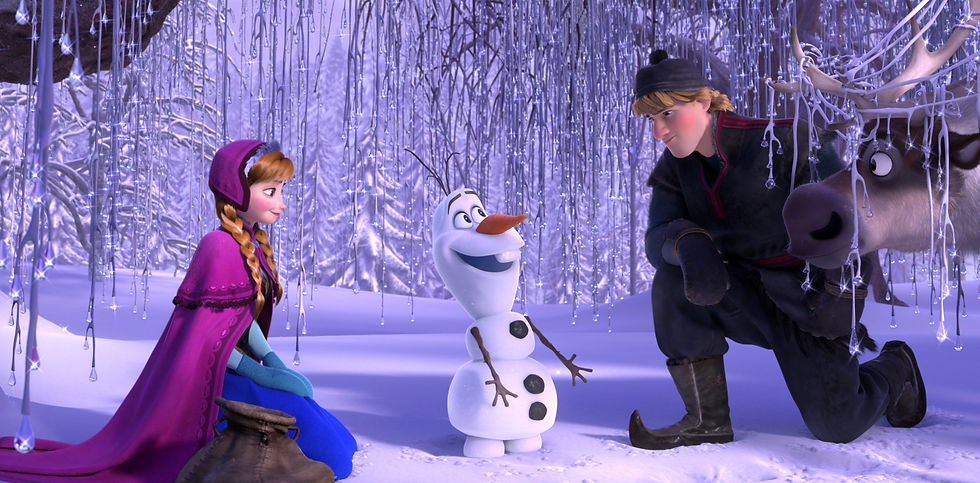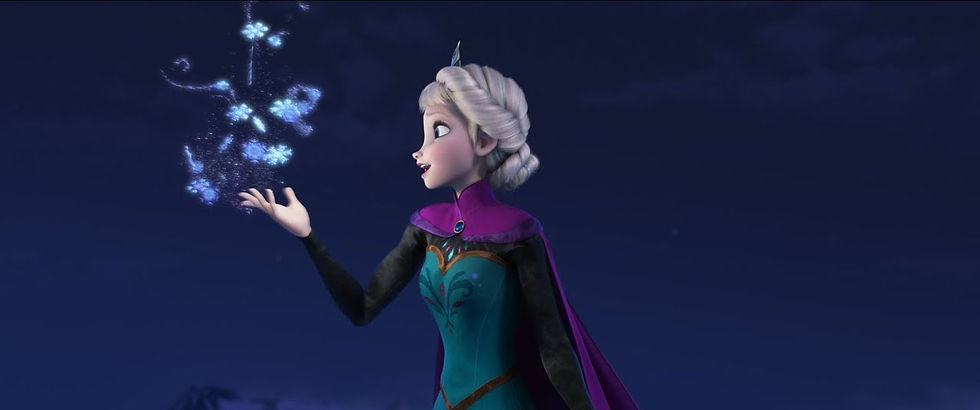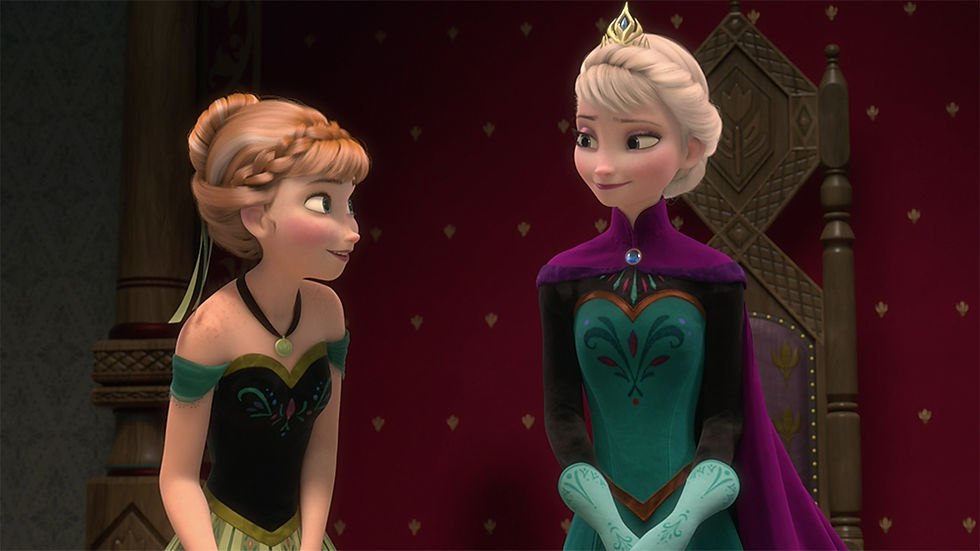Frozen
- Bryce Chismire
- Nov 17, 2019
- 10 min read
Updated: Mar 9, 2021
*SPOILER ALERT*
Tell me something: have you ever ventured into a movie that really spoke to you for a daring approach it had on something? And, how, for those reasons, it grew to become a global phenomenon that’s been exploited beyond all recognition?
I had a similar experience whenever, during my childhood and even into my adulthood, I saw The Lion King, but for others, especially in this generation, the one movie they most likely would point to is Frozen.
For some of you who may remember, I already critiqued part of the Frozen franchise when I looked at Olaf’s Frozen Adventure a while back. Well, now’s my chance to provide my intake on the one that started it all.
Here’s the story, just to be safe. Inspired by Hans Christian Andersen‘s classic tale “The Snow Queen”, it’s about two sisters, a happy-go-lucky girl named Anna, and a moody girl with ice powers named Elsa, who have both been estranged for most of their lives when a freak accident caused by Elsa's ice powers almost cost Anna her life. Then, at Elsa’s coronation, when she let loose her ice powers by accident, she fled to keep herself from hurting anyone, not to mention from ostracism from others who think she's a sorceress, not realizing that her ice powers engulfed the entire kingdom of Arendelle and subjected it to an eternal winter. So, Anna ventured out, along with a rugged iceman named Kristoff, his pet reindeer, Sven, and a talking snowman named Olaf, to search for Elsa, bring her home, and put an end to the winter that’s jeopardizing Arandelle.

When it first came out, Frozen was instantly hailed as one of the most groundbreaking movies ever made under the Disney name, to the point where it was commercialized like there was no tomorrow since then. When I first saw it, I didn’t see it as anything that spectacular, and just didn’t get what so many people liked about it, even though, don’t get me wrong, I liked it, too. Well, watching it again, not only was Frozen still good, but many of the things about it that worked really worked.
First case in point: the animation.
The movie was just brimming with fantastic colors and fluid movements of the characters, topped off with a fantastic overlay of details in the backgrounds and even in the weather patterns. The snowstorms? They’re incredible. I don’t know how much it cost to render them the way they were, but they looked almost as realistic as if it occurred in the shooting of a live-action movie. And again, the locations were beyond impressive. Arandelle was a rich, traditional, regal city that clearly took its inspiration from Norse culture, and its authenticity spoke for itself. And, the wintery locations expressed some of arguably the most attractive displays of winter ever put on screen. The colors, the details, the angles, how could you not want to immerse yourself in all its natural glories?
I never knew winter could be so beautiful.
Ditto, Anna.
Two, the music.
I just could not help but relish in Christophe Beck’s musical score in the movie, especially on the Vuelie, inspired by traditional Norse music. The melodies evoked a whole myriad of emotions while being authentic enough to take you to a different time and place. In fact, I’m a little surprised that Frozen didn’t get an Oscar nomination for this work.
The songs were super nice, too. They all conveyed nice rhythms to enhance the mood of the certain circumstances at hand, and while they were not flourishingly powerful, they still got the job done nicely.
Fortunately, there were four songs that stood out to me. The first was “For the First Time in Forever”. I just loved how the song continually rose to an arousing crescendo as Anna’s enthusiasm over the then-incoming Coronation Day mounted up. It was then balanced out nicely with an empathetic, almost soulful performance from Idina Menzel as she allowed Elsa’s concerns over Coronation Day to express themselves in all their clarity.
The second was “In Summer”. As delightful and giddy as Olaf himself (I’ll get to him soon), it was also hilarious due to what the song was about: Olaf’s desire to experience summer, despite the fact that he’s a snowman. As Olaf relished in his fantasies of what to do in summer, his obliviousness, and our awareness, of the long-term effects summer can have on snowmen like him gave this song a flavor of black comedy that’s too irresistible not to get a few chuckles over. Even Kristoff spoke for the audience as he moaned:
Somebody’s got to tell him.
The third song, to my surprise, was “Love is an Open Door”, the duet between Anna and Hans. The first time you see or hear it, you would've appreciated it as a truly upbeat romantic ballad that emphasized the amiable nature both Anna and Hans shared with each other. However, unlike In Summer, where its level of underlying irony was soft and humorous, by the time Hans revealed his true nature, the level of irony this song exhibited is meant to crash on you like a ton of bricks.
And the fourth song – Frozen fans rejoice – was "Let it Go".

Do I find it overplayed? Oh, yeah. But at the same time, after hearing it for the first time in...a long time (gotcha!), there are things to like about the song. For one, Idina Menzel really put her heart and soul into her singing via Elsa as she slowly started to accept herself and her isolation from society. And for another, I noticed how people drew comparisons between this song and Hakuna Matata, as they believed that they endorsed “dodging responsibilities”. Once again, I have to personally disagree with that statement. Much like how Hakuna Matata was meant to advise not letting your worries weigh you down in life, Let it Go expressed a nice message about not worrying about what others say about you and just let the real you shine through. In which case, I can see why it struck a chord with so many people, as well as why it won so many awards in its time.
Third, the story.
To make one thing clear, this is one of the rare times where I managed to read the original story before launching into Disney’s version of it. And while Frozen's story was by almost no means faithful to The Snow Queen, Disney's take on it was still neat, solid, and interesting. And it did so with the turmoil that came with family estrangement and what would've happened when someone possessed magical powers with no one even knowing about it until it’s too late. And, I ought to give Frozen credit for introducing us to a Snow Queen that was not evil, but rather conflicted and misunderstood. When done right, it can show hints, especially for children, of the world being not as black-and-white as it seems, and Frozen really nailed it there.
Fourth, the characters.
Anna and Elsa are some of the most nicely established and intriguing Disney Princesses ever introduced. They were both polar opposites, to plenty of degrees, but acknowledged that as much as they wanted to be the close sisters they always were as kids, their parents advised Elsa to keep her ice powers secret so that neither they nor anyone else could've been harmed by them. While Anna grew up to be a social butterfly, Elsa was moody and always expressed concern over keeping herself and her powers together. You could see where they’re both coming from, and it got to the point where you could relate to both of them, like I tended to.

And it didn’t stop there; both Anna and Elsa had their strong points and weaknesses, and they established complexities in their personalities. Anna was bubbly, socially awkward (amidst her excessive sociality), and yet showed determination in the face of unintended disaster, making her the funniest and most confident of the princesses. Elsa, with her dilemmas, made her troubled, insecure, and yet she tried as hard as she could have to keep anyone, especially Anna, safe from harm, and this made her the most sophisticated of the princesses. They also stood as nice metaphors for a certain theme that I will elaborate on later in this review.
Kristoff was a real wisecracker and an easy guy to like, despite him being occasionally arrogant and a romantic foil for Anna. His knowledge of the neighboring lands and his eccentric lifestyles managed to get a laugh out of me, and it was also admirable whenever he spoke or played around with his pet reindeer, Sven.
At first, I was unsure how to feel about Olaf, the snowman. Characteristically speaking, he was very delightful and a bundle of joy. Design-wise, however...well, let’s just say I found him childishly jarring. I was a little taken aback by his excessively cartoony design when comparing it to the more realistic, traditional surroundings within which he wandered. Even when my family and I saw the movie back in 2013, we thought for a second that he’s like Mickey Mouse if he was in Hugo. But as I watched the movie again, I was reminded of his origins at the hands of both Anna and Elsa as kids, and that he more or less was the physical manifestation of the still-living shred of connection between Anna and Elsa. So, in other words, of course he would’ve looked so cartoony. That, and, his overjoyed expressions and wisecracks managed to bring a little levity to the movie, even if some of them did go over the top. Those aspects of Olaf's personality consequently made me mind him a lot less over time, and they established him as being for Frozen what the Sultan was for Aladdin: he was pretty much the child-centric character. And there’s nothing wrong with that.
Hans sure lived up to the phrase “Prince Charming”, but in an artificial sense. His tendency toward others with his princely stature and good intentions established him as something of a role model and a potentially worthy suit for Anna. However, in a bombshell moment, he revealed himself to be interested in the Arandelle throne, not Anna, and was willing to kill Elsa in order to ensure safety for the kingdom, and the throne for himself. This was a bold move on Disney‘s part; not only did this turn the entire image of “Prince Charming” on its head, but it served as a nice contributor to what made Frozen so groundbreaking in the eyes of so many people.
For years, Disney was subject to mockery for having its princesses fall in love with the prince at first sight and then marry him shortly afterwards. Well, Frozen took the concepts of “love at first sight” and “true love’s kiss” and plunged into them not to exploit them, but to bring them into question. At Coronation Day, Anna and Hans met, and after spending the whole afternoon together, they instantly said to Elsa that they wanted to be married. Elsa then responded with a statement that started as a bombshell to Anna but grew to become words of wisdom for today’s audiences.
You can’t marry a man you just met.
And this was brought into discussion later on by Kristoff, again with Anna, to the point that he asked her if she knew anything about talking to strangers. Now that was a good point.
This also tied in nicely with Anna‘s insecurities. After trying and failing to talk to Elsa for so long, it would make sense for her to be the social butterfly she grew up to be. But as demonstrated by her and Hans’ faux relationship, being social with and trusting of someone to the point that it clouds one’s own judgment isn’t just unwise, it could be dangerous.
Which leads to Elsa's insecurities. While she did have the best intentions of keeping her powers secret and thus her peers safe from harm, it got to the point where it caused her to be too sheltered. It took a little push from people like Anna and, for better or worse, people like Hans in order for her to be a little more open about herself, and to not be so consumed by fear of what other people might think.
Along with the story, these elements did a nice job of balancing out the fairytale-inspired magic and whimsy with grounded, uncompromising realism.
The other characters were memorable in their own ways, too, including the Duke of Wesselton, who can be buffoonish one minute, and then conniving in the next, Anna and Elsa‘s parents, who had good intentions for them despite them eventually doing more harm than good, and the trolls, who happened to be Kristoff‘s foster family.
In fact, this reminds me, there are only three quibbles I have with Frozen. One is, Kristoff was introduced first as a young boy as he tried to harvest ice with the other, much older ice traders before being taken in by the trolls. What happened to his parents? Were the ice traders the only family he got by then? That one detail could’ve used a little more explanation.
Two, the reprise of For the First Time in Forever, while doing a nice job of juggling the speaking and singing voices of Anna and Elsa, also felt pretty rushed. I think, melodically, this could’ve used a little more breathing room as Anna and Elsa argued about returning to Arandelle to set things right.
And three was the design of the Abominable Snow Monst–I mean, Marshmallow. While I get that he was the physical manifestation of Elsa’s anguish, his design also felt a little too simplistic to accommodate his threatening nature. Ironically, when he came into battle mode against Hans and his men, this was when he looked exactly as I expected him to look. Yet, this nitpick was also backtracked by the fact that he, like Olaf, was created from Elsa’s imagination, so I can’t complain too much.
Ultimately, after all these years, Frozen still may not feel like the kind of animated movie that would sweep me away every time I see it – as well as speak to me on a level that was profound, relatable, and personal – like Aladdin, The Lion King, or Ratatouille. But as is, it is still a nicely-crafted, nicely-told, and truly resounding film. And, dare I say it, there isn’t a moment I can think of where I didn’t reflect on Frozen in admiration over its accomplishments. The story was inventive, the animation was a marvel to look at, some of the music was top-notch, and the characters were interesting in their own ways. I think as long as anyone going into Frozen can toss aside all the promotion and attention it received over the years, and not just their expectations, I’m pretty sure that they will find something to genuinely like about it and should relish in it while they can.
Frozen. It is the right kind of modern classic to take viewers by storm.

Additional Thoughts
As much as I liked but not loved Frozen, I am personally hoping that the upcoming sequel, Frozen II, will prove itself as a worthy followup. From what little I've seen of the movie through the promos and even a few interviews, I can't help but feel the suspicion that it will undoubtedly be as good as the first one, at least. Let's hope that it'll be the case!
Isn't it weird to think that two of some of the most popular franchises of the 2010s are Frozen and Game of Thrones, and that they both balanced out fantastical elements with hard-edged realism? What's even weirder is, in my opinion, Frozen is a little more tonally balanced by comparison. So sue me.





Comments